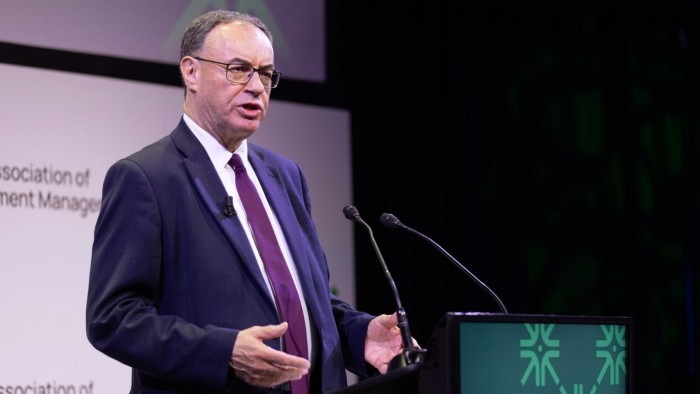Unlock the Editor’s Digest for free
Roula Khalaf, Editor of the FT, selects her favourite stories in this weekly newsletter.
Bank of England governor Andrew Bailey has called on the government to “minimise the negative effects” of Brexit by seeking closer alignment with the EU.
Bailey made the case on Thursday for non-tariff barriers to be reduced, particularly in the financial services industry, saying that less red tape would boost trade and economic growth.
His comments come after Prime Minister Sir Keir Starmer unveiled the UK’s “reset” deal with the EU this month. It includes plans to cut barriers to trade in areas including foodstuffs and electricity.
In a speech, Bailey welcomed the government’s efforts to increase trade with Europe but cautioned that Brexit had “weighed” on productivity and growth and suggested the UK and the EU should seek to further deepen their ties.
Bailey joined forces in November with chancellor Rachel Reeves in calling for the UK to rebuild relations with the EU, at a time when fears were growing about a transatlantic trade war after Donald Trump won the US presidential election.
The BoE governor, speaking in Ireland, suggested that more could be done to increase UK-EU trade in financial services, saying that a “two-way street” would deepen markets and benefit both sides.
“There is merit in seeking to increase the openness of our financial markets by reducing non-tariff barriers,” he told a financial services dinner in Dublin.
Reeves has argued that Britain should seek a closer trading relationship with the EU partly by agreeing to align rules between the two sides in “mature industries” such as the chemicals sector.
Starmer’s allies have said the UK-EU reset deal was a starting point for negotiations about closer relations and that the confidence built by new arrangements could lead to more ambitious moves to boost trade in the future.
Bailey said that, while he was not saying Brexit was “wrong”, it had created non-tariff barriers. “We should do all we can to minimise negative effects on trade,” he said.
He was clear on the benefits to both the UK and EU economies of increasing the openness of financial markets by reducing non-tariff barriers, as he disputed the idea that trade was a “one-way street” from Britain to the bloc.
“As with goods trade, open financial markets support economic growth as well as increasing investment and reducing the cost of capital,” Bailey said.
He added that close co-operation between the UK and EU was increasingly relevant in the context of the “increased market volatility” observed following Trump’s tariff announcements.







